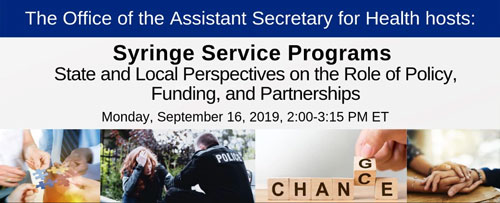Webinar: Syringe Service Programs – State and Local Perspectives on the Role of Policy, Funding, and Partnerships

Cross-posted from Office of Infectious Disease and HIV/AIDS Policy, U.S. Dept. of Health and Human Services
Webinar: State and Local Perspectives on the Role of Policy, Funding, and Partnerships
Monday, September 16, 2019 2:00 PM (EDT) - 3:15 PM (EDT)
This webinar will use examples from state government to showcase effective implementation of syringe services programs (SSPs) through policy and practice. Presenters will highlight experiences in gaining statewide support and community buy-in, crafting policy and bringing it to practice, and building strong partnerships with local communities to support SSP growth. This webinar is the second in a three-part series addressing SSPs, an important community-based prevention program that can save lives, combat the nation’s opioid crisis, reduce the transmission of HIV and hepatitis C and support individuals in accessing substance (SUD)/opioid (OUD) use disorder treatment services.
Intended Participants: state/local public health, law enforcement, corrections, harm reduction organizations, state/local elected officials, SUD/OUD programs, faith-based organizations, federally-qualified health centers (FQHCs), healthcare providers and other relevant organizations. Even if you are not able to participate in this webinar, register to receive the recording and announcements about future events and resources.
Syringe services programs or SSPs are community-based prevention programs that can provide a range of services, including linkage to substance use disorder treatment; access to and disposal of sterile syringes and injection equipment; and vaccination, testing, and linkage to care and treatment for infectious diseases, including hepatitis B and C.
SSPs protect the public and first responders by facilitating the safe disposal of used needles and syringes. Providing testing, counseling, and sterile injection supplies also helps prevent outbreaks of other diseases.
Nearly thirty years of research shows that comprehensive SSPs are safe, effective, and cost-saving, do not increase illegal drug use or crime, and play an important role in reducing the transmission of viral hepatitis, HIV and other infections.